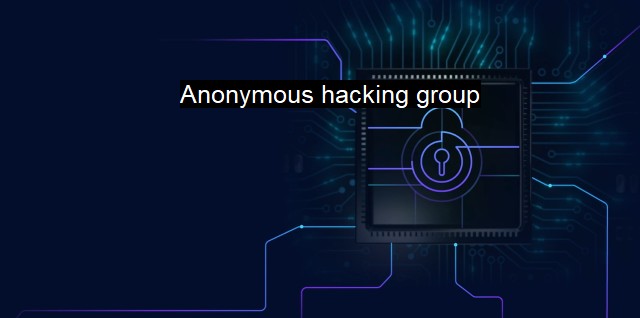What is Anonymous hacking group?
The Rise of Anonymous: A Look at the Evolution of Hacktivism and Cyber-Activism
The term "hacking" typically bears a negative connotation, often associated with crime, theft, or invasion of privacy. However hacking can have shades of ethical virtue when associated with certain groups — one of which is the 'Anonymous' hacking group. The group is distinctive, not only credited for notable cyber-activities worldwide but also because it operates under a decentralized form, making it truly anonymous. Though notorious, many consider them somewhat as 'hacktivists', carrying out activities that embody certain ethic codes still debatable by society. The story of Anonymous is intrinsically tied to the broader discourse on cybersecurity and antivirus protection.Founded in 2003 on the 4chan forum, Anonymous quickly gained notoriety for their collective actions in cyber protests and direct actions against individuals, organizations, and governments. The group is a loosely allied collective of hackers with no discernible hierarchy, working anonymously to effect change in areas they perceive as needing intervention.
The term 'Anonymous' was adopted from the anonymity under which all 4chan posters operate. It soon epitomized the concept of a headless organization, with no leadership, no membership application or fees, and no identifiable agenda - a perfect synonym of ambiguity yet quite powerful. Operating freely and quietly, its structure literally enables it to strike anywhere at any time, leaving no trace of who was responsible.
Anonymous gained extensive media coverage for their actions against the Church of Scientology, known as Project Chanology, where they criticized the church for Internet censorship. They launched a series of attacks, including DDoS, defacing websites, and prank calls. Anonymous accuses any entity they believe to be violating human rights, promoting censorship, or corrupt of behaving unethically and responds in kind with various hacking methodologies.
Anonymous has staged operations against governments worldwide to protest actions perceived as infringing on privacy or internet freedoms. Operation Payback launched against the Motion Picture Association of America and other copyright law proponents, retaliating excessive prosecution of illegal downloading and file-sharing sites.
Understanding the dynamic of these cyber-attacks becomes highly pertinent for cybersecurity. It raises questions about what entities in possession of sensitive information should do to safeguard it. In response to such threats, organizations have deployed antivirus software or firewalls, limit access to sensitive information, regularly update and patch software vulnerabilities, and educate staff about potential spearing or phishing attacks. Encrypting sensitive data is also a notable defensive measure. While this can prevent data theft by any third party, it is still not an undefeatable shield.
Without endorsing or casting moral judgments, the existence and actions of groups like Anonymous highlight facets where the typical cybersecurity discipline needs to evolve and anticipate uniquely sophisticated threats. One of the significant lessons here is there are no shortcuts to safeguarding information. Cybersecurity is a continually evolving field that requires constant vigilance, technological advancement, and robust strategic planning, given how such collectives can exploit software vulnerabilities and human gullibility to their advantage.
Anonymous, while being a symbol of protest and championing change, also invariably highlights security threats present in the expansive digital world, thus propelling the need for strong cybersecurity strategies and comprehensive antivirus measures. Balancing the rights to freedom and privacy with security remains a daunting challenge in the Cyber Age, and provides fodder for further research and discussion to determine how anonymous groups fit into the broader picture of Internet freedom versus cybersecurity.

Anonymous hacking group FAQs
What is Anonymous Hacking Group and what do they do?
Anonymous Hacking Group is a decentralized group of hackers who advocate for internet freedom, anti-censorship, and government transparency. They launch various cyber attacks and hacking operations against government institutions, corporations, and individuals who they perceive as threats to these values.Is Anonymous Hacking Group illegal?
Technically, Anonymous Hacking Group operates in a legal grey area since they do not have a central leadership or organization structure. However, many of their activities such as Distributed Denial of Service (DDoS) attacks and hacking into private networks are considered illegal and can lead to legal consequences.Can antivirus software protect against Anonymous Hacking Group attacks?
Antivirus software can protect against known malware and viruses, but it may not be effective in preventing attacks from Anonymous Hacking Group. The group uses a variety of sophisticated techniques such as social engineering and zero-day exploits to penetrate networks and systems, which antivirus software may not detect.How can I protect myself from Anonymous Hacking Group attacks?
To protect yourself from Anonymous Hacking Group attacks, you should practice good cybersecurity hygiene such as using strong passwords, updating your software and operating system, and avoiding suspicious links or attachments. Additionally, using multi-factor authentication, encrypting your data, and keeping backups of your important files can also help minimize the impact of a potential attack.| | A | | | B | | | C | | | D | | | E | | | F | | | G | | | H | | | I | | | J | | | K | | | L | | | M | |
| | N | | | O | | | P | | | Q | | | R | | | S | | | T | | | U | | | V | | | W | | | X | | | Y | | | Z | |
| | 1 | | | 2 | | | 3 | | | 4 | | | 7 | | | 8 | | |||||||